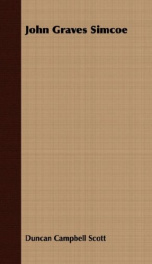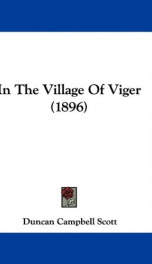john graves simcoe

THE MAKEIt F CANADA JOHN GRAVES SIMCOE BY DUNCAN CAMPBELL SCOTT TORONTO MORANG CO., LIMITED 1910 Entered according to Act of the Parliament of Canada in the year 1905 by Morang Co., Limited in the Depart ment of Agriculture CONTENTS CHAPTER I THE CANADA ACT . . . .1 CHAPTER II THE SIMCOE FAMILY . . . . 15 CHAPTER III THE MILITARY JOURNAL 1777 TO 1781 . . 23 CHAPTER IV BEFORE UPPER CANADA 1781 TO 1791 . . 39 CHAPTER V PIONEERS, O PIONEERS . . .51 CHAPTER VI THE LEGISLATURE .... 79 CHAPTER VII LAND AND TRADE . . . .101 CHAPTER VIII THE ALARMS OF WAR ... 117 JOHN GRAVJES SIMCOE CHAPTER IX Page THE CHURCHES AND EDUCATION . .155 CHAPTER X A SILVAN COURT , . . . . 177 CHAPTER XI FOUNDING A PROVINCE . . . ,195 CHAPTER XII AFTER UPPER CANADA ... 219 CHAPTER XIII NON SIBI SED PATRLE . . . ,223 INDEX 237 CHAPTER I THE CANADA ACT IT was on February 25th, 1791, that a royal message apprised the House of Commons that it was the intention to divide Quebec into two separate provinces, and the bill was introduced on March 7th by Pitt. The advisability of repealing the Quebec Act had been the subject of much agitation and debate, and hardly had the peace been concluded when demands were made, mainly by the English-speaking inhabitants of the pro vince, for a properly constituted House of Assembly and for the trial by jury in criminal cases. The portions of the province above Montreal had become settled by soldiers of the disbanded regi ments and by Loyalist refugees, and they desired a change in the tenure of land to free and common socage from the feudal tenure which obtained under the Quebec Act of 1774. The partizan bias of some of the foremost agitators for these changes, in what afterwards became the lower province, led to proposals designed rather to place the strength of government in the hands of the minority than to establish upon broad and generous principles a government for the people, legislating for the good of the province. The spokesman of these agitators 1 JOHN GRAVES SIMCOE for constitutional changes, Mr. Adam Lymburner, a Quebec merchant of Scottish extraction, requested that one half the representatives from Lower Cana da should be chosen from the towns, which would throw the balance of power into the hands of his party and race. But it was with a very different desire and actuated by a nobler motive that the bill which was to inaugurate the principle of col onial self-government was designed and carried. Grenville, writing to Guy Carleton, Lord Dorches ter, then governor-general of Canada, on October 20th, 1789, accompanied a draft of the proposed bill with a general survey of the measure. The letter contains a paragraph elucidating the principles upon which the bill was drawn Your Lord ship will observe that the general object of this Plan is to assimilate the constitution of that Province to that of Great Britain, as nearly as the difference arising from the manners of the People and from the present situation of the Province will admit. In doing this a considerable degree of attention is due to the prejudices and habits of the French Inhabi tants, who compose so large a proportion of the community, and every degree of caution should be used to continue to them the enjoyment of those civil and religious Rights which were secured to them by the Capitulation of the Province, or have since been granted by the liberal and enlightened spirit of the British Government. It is upon the life and power of these principles 2 THE CANADA ACT that the welfare and harmonious permanency of the Canadian confederation depends. Such expressions could not have fallen coldly upon the mind of Dorchester they are in effect his own, and are merely the echo of opinions and senti ments by which his conduct as governor was con sistently guided. The weight of his judgment was thrown against the division of the province...
Info about the book
Author:
Series:
Unknown
ASIN:
B001JBARES
Rating:
3/5 (3)Your rating:
0/5
Languge:
English
Users who have this book
Users who want this book
What readers are saying
What do you think? Write your own comment on this book!
write a commentGenre
if you like john graves simcoe try:
Do you want to read a book that interests you? It’s EASY!
Create an account and send a request for reading to other users on the Webpage of the book!







